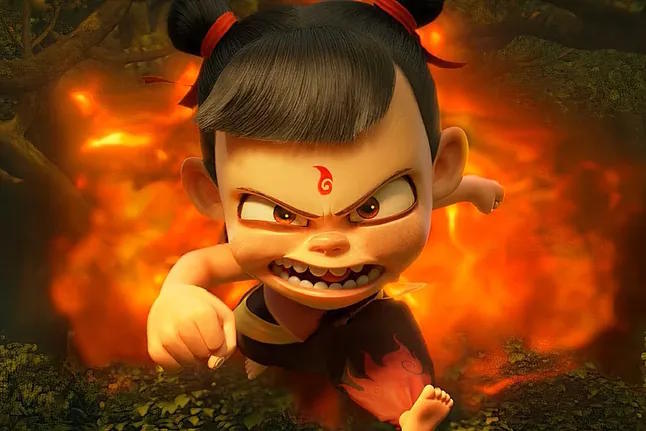In the celestial lands, where gods and mortals cross paths, Ne Zha, a boy with powers born from a cosmic energy sphere, faces a new threat after the heroic sacrifice he made to save his people in the first movie. Brought back to life thanks to the gods reconstructing his spirit with magical lotus leaves, Ne Zha is on a mission to recruit other fallen heroes for his cause, which is to fight against an ancient demon that has awakened.
This would be the summary of a story based on Chinese mythology that has ended up shaping an animated film that has become the highest-grossing of all time in a single market. In its first 10 days in the box office of the Asian giant, coinciding with its first week during the Chinese New Year holidays, Ne Zha 2, the sequel to the adventures of the boy who fights demons, has grossed over 8 billion yuan, which is over 1 billion euros at the exchange rate.
This feature film has already broken all records at the Chinese box office, even surpassing the popular 2021 war epic The Battle at Lake Changjin. From Beijing, it is pointed out that the second part of Ne Zha has also surpassed the Marvel universe, which with Avengers: Endgame (2019) grossed approximately 858 million dollars (830 million euros) at the U.S. box office and has dethroned Star Wars: The Force Awakens, with 936 million. The film has surpassed the $1 billion revenue mark, the first in China to achieve this.
"Why is Ne Zha 2 so popular? Some say it is due to its well-developed characters and the modern adaptation of a traditional story that resonates deeply with the audience," reads a review from the Chinese newspaper Global Times.
The story of Ne Zha is based on the literary classic Fengshen Yanyi, a 16th-century novel that narrates the war between gods and demons. The film also draws from other Chinese legends, such as the adventures of Sun Wukong, the Monkey King who embarks on a journey for redemption and who gained Western market attention thanks to one of the best-selling video games worldwide last year, Black Myth: Wukong.
The success on the big screen of Ne Zha, which will soon hit theaters in other countries like the United States, Australia, or Japan, has boosted morale in an industry that is declining. Chinese cinemas, following the global trend, are losing more audience each year. In 2024, although there are no official data yet, several specialized media outlets revealed that ticket sales revenue dropped by 25%.
This decline has prompted the China Film Administration to launch several campaigns and subsidies to lower ticket prices and release up to six films during the recent holidays. "Those under 30 now represent less than half of the audience compared to 65% in 2018", stated a report in December from a research institute of the tech giant Alibaba, blaming the box office decline on the economic turmoil facing the Asian superpower, starting with high youth unemployment.
Micro-Dramas, Between TikTok and Netflix
In addition to this, the growing success of platforms like iQIYI, the Chinese Netflix, and the overwhelming emergence of micro-dramas: series filmed vertically to watch on mobile phones with episodes that barely last a minute. The media has described them as a cross between TikTok and Netflix.
This new format of mini soap operas, which already generates over 5 billion euros annually, has hooked millions of Chinese viewers who can binge-watch several series in an afternoon. It is common on social media for users to share viral memes of the dramatic performances in these series with outlandish plots that often resemble sketches from Pantomima Full.
Now, major Chinese film companies are investing heavily to expand the production of these short-format series. Streaming platforms now feature their own channels of micro-dramas that are increasingly popular among a young Chinese audience detached from Hollywood's major productions. In 2024, only one American film (Godzilla vs. Kong: The New Empire) made it to the top 10 most-watched films in Chinese cinemas.
Less than a decade ago, the top three highest-grossing films in China were usually from Hollywood, although it is also true that fewer and fewer American films are entering the Chinese market. It is the Film Administration, a division of the propaganda department of the ruling Communist Party, that decides the quota of foreign films that can be released in the country, which is usually around thirty each year.
